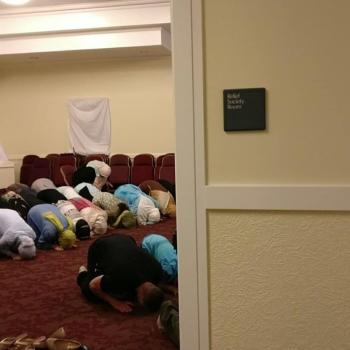
Below is my translation of Qur’an 2:30-38. It is not identical to the rendering of the same passage in M. A. S. Abdel Haleem’s 2005 translation of The Qur’an for the Oxford World’s Classics series, but I freely acknowledge that it’s very similar. That’s not coincidental. I like Abdel Haleem’s translation; it’s the one that I’ve used for roughly five years now in my classes on the Qur’an in English translation. I used it as the basis for my own version, below, but modified it as various points (as will be readily apparent to anybody who compares them). I’ll offer just a bit of commentary on the other side of the quoted passage:
- When your Lord told the angels, “I am putting a deputy on the earth,” they said, ‘Will you put someone there who will cause damage and bloodshed, while we celebrate Your praise and proclaim Your holiness?” But He said, “I know things you do not know.”
- He taught Adam all the names. Then He showed them to the angels and said, “Tell me the names of these if you truly [think you can].”
- They said, “May You be glorified! We only have knowledge of what You have taught us. You are the All Knowing and All Wise.”
- Then He said, “Adam, tell them their names.” And when he told them their names, [God] said, “Did I not tell you that I know what is hidden in the heavens and the earth, and that I know what you reveal and what you conceal?”
- When We told the angels, “Bow down before Adam,” they all bowed down. Except Iblis, who refused and was arrogant: he was among the disobedient.
- We said, “Adam, live with your wife in this garden. Both of you eat freely there, wherever you wish. But do not approach this tree, lest you both become wrongdoers.”
- But Satan caused them to fall and drove them out of the state that they had been in. We said, “Get out [all of you]! You shall be at enmity with each other. On earth you shall have a place to stay, and livelihood—for a while.”
- Then Adam received some words from his Lord and He accepted his repentance. (He is the Ever Relenting, the Most Merciful.)
- We said, ‘Go down from [the Garden], all of you! But when guidance comes from Me, as it certainly will, there will be no fear for those who follow My guidance, nor will they grieve.
This overall story should be familiar to most readers, though there are obvious differences. Similar passages occur at multiple places throughout the Qur’an (I haven’t counted them), but this is the first of them.
30. The Arabic word that I’ve translated as deputy is khalifa (خَلِيفَة, pronounced kha-LEEF-a), which is usually rendered in English as caliph. That term is best known to Westerners as the title of the central ruler of the Islamic world, especially from the seventh century through roughly the thirteenth century, but also as the title of the restored “caliphate” for which many Muslim fundamentalists (and Muslim extremists) yearn. The so-called “Islamic State” — Daesh or ISIS or ISIL — claimed in its heyday to be a “caliphate,” led by the late Abu Bakr al-Baghdadi, who claimed the title of khalifa or caliph. At its core, the Arabic word means something like “stand-in,” “deputy,” “vicegerent,” or “vicarious representative.” After the death of the Prophet Muhammad, the community was led by the khalifat rasul Allah, the khalifa of the Messenger of God. The use of the word here for Adam is, I think, quite interesting.
31-33. Although the Qur’an doesn’t mention animals here, it seems probable to me that the reference is to Adam’s naming of the animals, as mentioned in Genesis 2:19-20.
34. The name Iblis (pronounced eh-BLEES) derives ultimately from the same sources as the English words devil and diabolical, the Greek word διάβολος (diábolos, “slanderer,” from διαβάλλειν [diabállein, “to slander,” from διά (diá, “across, through”) and βάλλειν (bállein, “to hurl”)]. He is generally treated not as an angel but as one of the jinn, or “genies.”
34. The story of Satan’s fall told here — Iblis is also referred to as al-Shaytan, “Satan” — is obviously quite different from that familiar to Latter-day Saints. But there is a common element: pride or arrogance, and the disobedience to God that such arrogant pride fueled.
36. The Arabic plural imperative verb that, like Abdel Haleem, I’ve translated here as “Get out!” (اهۡبِطُوۡا, ihbitu) really means “Go down!” or “Descend!” That’s actually how I translated it in verse 38. For various reasons, I chose not to render it that way here in verse 36, but it’s important to understand that it is connected with the idea of descent. Verses 36 and 38 both suggest (as do other, related, passages, that the “fall” of Adam and Eve consisted, according to the Qur’an, in a literal descent from an elevated place — or, to look at the matter from a different angle, that the Garden of Eden was pictured, Qur’anically speaking, as being somehow “up,” above the terrestrial world in which Adam and Eve spent the rest of their lives and in which we now live.
37. The idea that Adam was given certain unspecified “words” (كَلِمٰتٍ) is both tantalizing and intriguing. What could they be?
38. It’s also striking to me that, at the very time of the Fall of Adam and Eve, they are also given a promise of eventual redemptive guidance.
***

(Photo from Wikimedia Commons public domain)
Two weeks ago or thereabouts, I responded to somebody who had noted that Latter-day Saints, as a group, are not universally beloved. I called his attention to the work of Dr. Gary Lawrence, which points out that “Gentiles” who actually know one or more Latter-day Saints personally (and who are aware that they do) tend to think more positively about Church members as a group than do non-members who have no Latter-day Saint acquaintances (or, at least, are unaware of any). I compared this to the well-known fact that, even under the lethal anti-Semitism of Hitler’s Third Reich, Germans and Austrians who claimed to be ardent supporters of the Führer’s anti-Jewish policies would nonetheless write letters to the Nazi authorities begging for exceptions to be made for their long-time neighbor Frau Klein or their family physician, Dr. Goldberg, or their friend Herr Lübeck. (Such letters are still extant in archives.)
My point, of course, was that it’s far easier to demonize or stigmatize people in the abstract, at a distance, than to do so when they’re not merely far-off Others.
My point was absolutely not that the treatment of the Latter-day Saints has been even remotely on a par with the persecution and pogroms — and, of course, the Holocaust — that have been directed at the Jews. There were some episodes in the 1830s and 1840s that became quite bad for members of the Church, of course, but our situation has been far better since our emigration to the Great Basin West — and there is, mercifully, absolutely no parallel in the history of the Latter-day Saints to Auschwitz, Bergen-Belsen, Buchenwald, Dachau, or Mauthausen. Not even close.
As if any sentient and even minimally informed person could possibly imagine otherwise.
And I’m arguably both sentient and, regarding the Shoah, somewhat better than minimally informed.
A few folks who are perpetually determined to understand (or to misunderstand) everything I say and do in the worst possible fashion have recently decided to misrepresent me on this point. (For them, I’m an utterly bizarre combination of stupidity and moral depravity whose capacity for obtuse wickedness is functionally boundless.) I thought it advisable to correct their misrepresentation. Not, of course, that they’re likely to accept the correction.












